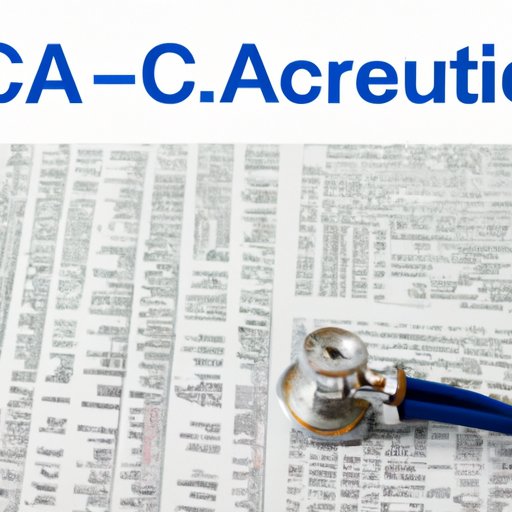Introduction
The Affordable Care Act (ACA) was enacted in 2010 to improve access to health care for all Americans, regardless of their health status. One key component of the ACA is Section 1557, which prohibits discrimination on the basis of race, color, national origin, sex, age, or disability in any health program or activity that receives federal financial assistance. This includes Medicare programs, which provide health insurance coverage to seniors and people with disabilities.
This article will explore the various Medicare programs that are covered under ACA Section 1557. We’ll look at the scope of coverage and how it affects Medicare programs, as well as provide an overview of the eligibility requirements and assistance available to beneficiaries. By understanding these components of ACA Section 1557, we can better understand how it impacts our access to quality health care.
Exploring the Medicare Programs Covered by ACA Section 1557
First, let’s take a closer look at the scope of coverage under ACA Section 1557. According to the U.S. Department of Health and Human Services Office for Civil Rights, this law applies to “any health program or activity, any part of which receives federal financial assistance, including credits, subsidies, or contracts of insurance, or which is administered by an executive agency or any entity established under this title.” In other words, any Medicare program or activity that receives federal funding is subject to the protections offered by Section 1557.
Now, let’s examine how ACA Section 1557 affects Medicare programs. The main purpose of this law is to ensure that all individuals, regardless of their protected class, have equal access to health care. As such, it prohibits discrimination in any health program or activity, including Medicare programs. This means that Medicare programs must provide equal access and treatment to all beneficiaries, regardless of their race, color, national origin, sex, age, or disability.
A Comprehensive Guide to Medicare Programs Covered by ACA Section 1557
Now that we’ve discussed the scope of coverage under ACA Section 1557, let’s dive into the specifics of which Medicare programs are affected. Here’s a comprehensive guide to the Medicare programs that are covered under ACA Section 1557:
Medicare Part A
Medicare Part A is the hospital insurance portion of Medicare. It covers inpatient hospital stays, skilled nursing facility care, hospice care, and some home health care services. Medicare Part A is available to all individuals who are 65 years or older, as well as those under 65 who meet certain criteria, such as certain disabilities.
Medicare Part B
Medicare Part B is the medical insurance portion of Medicare. It covers doctor visits, lab tests, preventive care, durable medical equipment, and some home health care services. Medicare Part B is available to all individuals who are 65 years or older, as well as those under 65 who meet certain criteria, such as certain disabilities.
Medicare Part D
Medicare Part D is the prescription drug coverage portion of Medicare. It covers most prescription drugs, as well as some over-the-counter medications. Medicare Part D is available to all individuals who are 65 years or older, as well as those under 65 who meet certain criteria, such as certain disabilities.
Medicare Advantage Plans
Medicare Advantage Plans are private health plans that offer an alternative to traditional Medicare. They typically provide additional benefits, such as vision and dental coverage, as well as lower out-of-pocket costs. Medicare Advantage Plans are available to all individuals who are 65 years or older, as well as those under 65 who meet certain criteria, such as certain disabilities.
Other Medicare Programs
In addition to the above programs, there are several other Medicare programs that are covered under ACA Section 1557. These include Medicare Special Needs Plans, Medicare Cost Plans, Medicare Savings Programs, and Medicare Supplement Insurance (Medigap). All of these programs are available to individuals who are 65 years or older, as well as those under 65 who meet certain criteria, such as certain disabilities.
Understanding How ACA Section 1557 Impacts Medicare Coverage
Now that we’ve taken a look at the Medicare programs that are covered under ACA Section 1557, let’s examine how this law affects coverage for these programs. First, it prohibits discrimination on the basis of race, color, national origin, sex, age, or disability in any health program or activity, including Medicare programs. This means that Medicare programs must provide equal access and treatment to all beneficiaries, regardless of their protected class.
In addition, ACA Section 1557 provides additional protections for Medicare beneficiaries. For example, it requires Medicare plans to cover certain medically necessary services, such as mental health services and preventative care. It also prohibits Medicare plans from imposing higher cost-sharing requirements on certain services, such as mental health services, than they do on other services.

Examining the Impact of ACA Section 1557 on Medicare Programs
Now let’s take a look at how ACA Section 1557 affects the costs associated with Medicare programs. The law prohibits Medicare plans from charging higher premiums or cost-sharing requirements based on an individual’s race, color, national origin, sex, age, or disability. This ensures that all beneficiaries have equal access to the same level of coverage, regardless of their protected class.
In addition, ACA Section 1557 has had an impact on other aspects of Medicare programs. For example, the law requires Medicare plans to provide clear and accessible information about their coverage options. It also requires Medicare plans to cover certain preventive services at no cost to the beneficiary.

Unpacking Medicare Programs Covered Under ACA Section 1557
Now that we’ve discussed the impact of ACA Section 1557 on Medicare programs, let’s take a look at the eligibility requirements for these programs. In general, all Medicare programs are available to individuals who are 65 years or older, as well as those under 65 who meet certain criteria, such as certain disabilities. Individuals may also need to meet income and resource limits to be eligible for certain programs.
Once an individual has determined that they are eligible for a Medicare program, they must then complete the enrollment process. This typically involves submitting an application to the Social Security Administration, as well as providing proof of identity and citizenship. For some individuals, assistance may be available to help with the enrollment process.

A Primer on ACA Section 1557 and its Impact on Medicare Programs
To recap, ACA Section 1557 is a key component of the Affordable Care Act that prohibits discrimination on the basis of race, color, national origin, sex, age, or disability in any health program or activity that receives federal financial assistance. This includes Medicare programs, which provide health insurance coverage to seniors and people with disabilities.
Under ACA Section 1557, Medicare programs must provide equal access and treatment to all beneficiaries, regardless of their protected class. It also provides additional protections for Medicare beneficiaries, such as requiring Medicare plans to cover certain medically necessary services and prohibiting them from charging higher premiums or cost-sharing requirements based on an individual’s protected class. Finally, it sets forth the eligibility requirements for Medicare programs, as well as outlines the steps for enrolling in a Medicare program.
Conclusion
In conclusion, ACA Section 1557 is an important component of the Affordable Care Act that provides important protections for Medicare beneficiaries. It prohibits discrimination on the basis of race, color, national origin, sex, age, or disability in any health program or activity that receives federal financial assistance, including Medicare programs. It also sets forth the eligibility requirements for these programs, as well as outlines the steps for enrolling in them. By understanding these components of ACA Section 1557, we can better understand how it impacts our access to quality health care.
For more information on ACA Section 1557 and its impact on Medicare programs, please visit https://www.hhs.gov/civil-rights/for-individuals/section-1557/index.html.
(Note: Is this article not meeting your expectations? Do you have knowledge or insights to share? Unlock new opportunities and expand your reach by joining our authors team. Click Registration to join us and share your expertise with our readers.)
